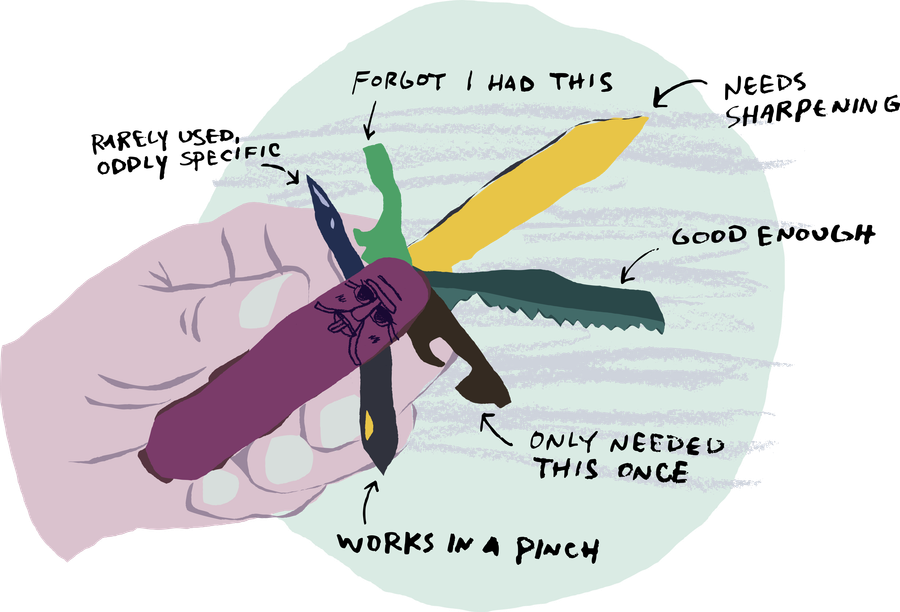I sure didn't expect to be unemployed this year. For a decade I worked as a web manager and developer for the U.S. Forest Service's Research & Development branch. I supported scientists and communications teams in sharing their work with land managers, researchers, extension forestry, and the general public. This was research grounded in real-world needs: how to manage pests and diseases, how to adapt forests to climate change, how to sustain timber production and forest health in a changing landscape. I loved the mission, the people, and the work. I was beyond pleased to consider this the job from which I would retire. I was already planning to ask for a vegan ice cream cake at my farewell party in 25 years.
In hindsight, that optimism feels a bit misplaced. There was a presidential election, and forces were already gathering—intent on dismantling the civil service, deprioritizing climate work, and reshaping the government itself. I should have taken the Project 2025 initiative more seriously. It's a destructive and heavy-handed playbook, and one that I naively assumed would stay on the fringe.
My bad. I was not prepared for the speed and scope of what would happen after the presidential inauguration in January. Nor for the outright hostility toward civil servants like me, cast as wasteful, resource-sucking bureaucrats and demonized as obstacles to some imagined better version of America. (See also: Russell Vought, Director of the Office of Management and Budget, saying that he wants to put us "in trauma"; and Georgia Representative Marjorie Taylor Greene claiming we are undeserving of our jobs and paychecks.)
I admit I didn't fully grasp the trajectory we were on. The seemingly sudden upwelling of negative sentiment and villainization was disorienting and distressing.
Then DOGE began sending out shady-looking emails addressed from the Office of Personnel Management, dangling a resignation offer: voluntarily quit within the next week, and continue to receive pay and benefits through September. They flippantly pitched it like a cruise brochure: I could take this sweet buyout and "go on my dream vacation."
I ignored that, and carried on for another two months, increasingly fatigued by the mandate to return to in-person work at an office staffed with people outside my own unit, murmurings of mandatory relocations, layoffs, and downsizings. When a new resignation offer came through in April, it felt less like a choice to be considered than the only lifeline available to me at the time.
So I signed the deferred resignation agreement. On paper, it was an objectively good deal: five months to figure out my next move. Technically, I am still employed, but I'm not working—Schrödinger's job status. But I grieved that decision. I loved my job, and I believed in the work we did.
And now here I am, three months later, still grappling with my loss of direction, and unsure of whether I made the best decision. Feeling fully unmoored, adrift in the job market, trying to reassemble a career-relevant identity.
Because, first off, I'm not sure what to call myself. Over the years, my work evolved so frequently that most tidy job titles feel like a poor fit. I've done many things, often learning them as I went. I tried to bridge gaps between teams and look for areas where we could improve processes.
Web developer? Yeah, I've completed full website redesigns from the ground up, created WordPress themes, used PHP to integrate with databases. Until my team pivoted to focusing on video production for a couple years, during which time I practiced writing scripts, filming in the field, editing, motion graphics, and even writing and recording audio descriptions for accessibility. Then there were dozens of hybrid meetings I helped produce, from livestreaming and equipment setup to post-production. I've trained contributors in our CMS, written content strategy documents, maintained databases, painstakingly remediated ancient PDFs for Section 508 compliance. I've built automated project request tracking systems and gone bleary-eyed scouring Google Analytics for worthwhile metrics to guide content and design decisions. And on and on.
I'm a generalist. Not because I can't go deep, but because the work continually shifted and the priorities changed. I can recognize my adaptability as a strength, but how do I convey that strength on a job application? I know that beneath my shifting roles there is a consistent set of strengths:
- A detail-oriented eye for clarity, consistency, and quality
- Supporting cross-functional teams with empathy and precision
- Prioritizing accessibility, equity, and usefulness
- Translating complex ideas into something people can use and understand
- Identifying, implementing, and documenting process improvements
I guess that's part of why I'm writing this—to remind myself of what I bring to the table, and to make sense of where I go from here. I'm reflecting, asking questions, hoping for answers, practicing openness. And while I worry that this whole thing is self-indulgent, that's okay because this is my blog.
I want to be part of a team where my technical and my soft skills matter. Where I can help people do meaningful work. I do believe there are opportunities for generalists who are attentive, step in where needed, and help make things happen.
So here's to the moments when the unknown feels less like a void, and more like an opening to whatever's next.

